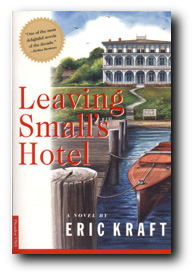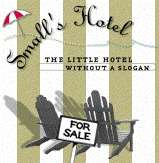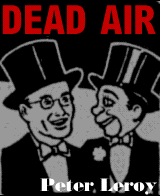
YOU CAN READ
|
Chapter 9
September 18 The Wall of Happy Diners
JUST INSIDE THE DOOR of the Babbington Diner there was a stack of giveaway papers and advertising brochures. We picked up a copy of House and Home, a booklet full of real estate ads. The hotel was advertised in it. It would be fair to say that it was featured, since it had been given half a page. There was a handsome photograph, from the front, that made it look like something worth owning. The copy began, “Do you have a dream? Do you dream of running your own luxury hotel?” Albertine read it aloud and burst out laughing. “Do you have nightmares?” she asked. “Do you wake up screaming? Do you worry about leaking plumbing, exploding boilers, and skyrocketing taxes?” I laughed with her, and I didn’t ask her what she meant by “skyrocketing taxes.” THERE WERE SIX in my audience for the reading of the ninth episode from Dead Air, “The Wall of Happy Diners.” Elaine had returned, and she had brought with her a gray and cuddly couple, Alice and Clark, longtime friends of Lou’s. |
 |
||||||
“Got a great idea!” he said when I walked in one afternoon. “A great idea!” He came out from behind the counter, grabbed me by the shoulder, and tugged me over to the west wall of the building, saying, “Come here, come here.” We stood in front of the wall, and he asked, “You know what this is?” “A wall,” I said. “A wall, yes. A wall. A wall! And in any other clam bar it would be just a wall. But this isn’t any other clam bar. This is the house of hopes and dreams.” “So this isn’t just a wall,” I said, extrapolating. “No, no, no, no, no,” he said, shaking his head. “It’s the Wall of Happy Diners.” “The Wall of Happy Diners,” I said. “Here’s the idea. We’re going to keep a camera behind the counter, see?” “Yeah . . .” “And we’re going to take candid photographs of people eating. Then we’ll put them up here, on the Wall of Happy Diners.” “That is a great idea,” I said. “I’ll take the pictures.” “And we can use your camera,” said Porky. I launched into the project with gusto. For a week or so, I spent every spare hour at the clam bar, lurking, stalking, spying, and—whenever I saw someone who looked like a happy diner—snapping pictures. I shot a couple of rolls. When the pictures came back from Himmelfarb’s Photography Shop, Porky and I looked through them. “We’ll put the really happy ones in a pile of their own,” he said. “Those are the ones I want on the wall.” After the first pass, we had only one unambiguously happy diner. His girlfriend was tickling him. We started through again. “Is this lady smiling?” Porky asked. “She could be,” I said. “Yeah, could be. Could be. It’s like when people say a baby is smiling and it’s really just gas. These aren’t happy diners. They’re just people with gas.” “Don’t get discouraged,” I said. “Remember—this is the house of hopes and dreams.” “Yeah, but some dreams are just illusions,” he said. He shoved the pictures away. “Maybe we could hire somebody to—” “No, no, no,” he said at once, reaching over to give me a pat on the shoulder. “We don’t need a professional. You’re doing a fine job. So, the pictures are a little out of focus—that’s okay. It makes them look more natural! It’s not the photographer, it’s—” “I meant hire somebody to be in the pictures.” “What?” “We could get some nice-looking people to pose. They could be sitting in a booth, eating fried clams. They could be happy diners.” “You mean they could act like happy diners.” “Yeah.” “I’m surprised at you. Really surprised at you. In fact, I’m shocked. You’re talking about faking these pictures.” “Not faking.” “What would you call it?” “Posing.” “And that’s not faking?” “I guess you’re right,” I said. “I’ll keep taking the candid shots. Eventually we’ll fill that wall with happy diners. You’ll see.” I asked just about everybody I knew to play the part of a happy diner. Some of them were willing to do it. My friends Raskol and Marvin and Matthew and Spike played a bunch of kids having fun at lunch. I had to buy the lunch, but it was worth it. Mrs. Jerrold, a neighbor of mine, brought her husband and another couple, and the four of them played grown-ups on the town, whooping it up. Porky played the part of someone who didn’t know what was going on. Within a week, the Wall of Happy Diners began to fill with pictures of diners who appeared to be happy. There were Raskol, Marvin, Matthew, and Spike, clowning around, throwing fried clams at one another, and there were Mr. and Mrs. Jerrold leaning together, smiling, feeding each other clam chowder, apparently a happy, loving couple. The pictures made an attractive display. You couldn’t tell that they were fakes. |
 |
|||||||
 |
I WAS READING, already under the quilt, when Albertine came running
out of the bathroom naked and shivering, threw herself under the covers
and snuggled against me.
|
|||||||
|
LEAVING SMALL’S
HOTEL | CHAPTER 10 | CONTENTS
PAGE
|
||||||||
 Here
are a couple of swell ideas from Eric Kraft's vivacious publicist, Candi
Lee Manning: Here
are a couple of swell ideas from Eric Kraft's vivacious publicist, Candi
Lee Manning:
Tip the author. You can toss a little something Kraft's way through the Amazon.com Honor System or PayPal.
We'll send you notifications of site updates, new serials, and Eric Kraft's public lectures and readings. Just fill in this form and click the send-it button.
|
[MORE] DO YOU HAVE YOUR COPY? Leaving Small’s Hotel is published in paperback by Picador, a division of St. Martin's Press, at $14.00. You should be able to find Leaving Small’s Hotel at your local bookstore, but you can also order it by phone from: Bookbound at 1-800-959-7323You can order it on the Web from Amazon.com Books.
Copyright © 1998 by Eric Kraft Leaving Small’s Hotel is a work of fiction. The characters, incidents, dialogues, settings, and businesses portrayed in it are products of the author's imagination and are not to be construed as real. Any resemblance to actual events or persons, living or dead, is entirely coincidental. All rights reserved. No part of this book may be reproduced or transmitted in any form or by any means, electronic or mechanical, including photocopying, recording, or by any information storage and retrieval system, without permission in writing from the author. Leaving Small’s Hotel was first published on May 11, 1998, by Picador USA, a division of St. Martin’s Press, 175 Fifth Avenue, New York, New York 10010. For information about publication rights outside the U. S. A., audio rights, serial rights, screen rights, and so on, contact Alec “Nick” Rafter at Manning & Rafter Advertising, Promotion, Public Relations & Used Cars. |
ABOUT
THE PERSONAL HISTORY
LITTLE
FOLLIES
|
||||||

